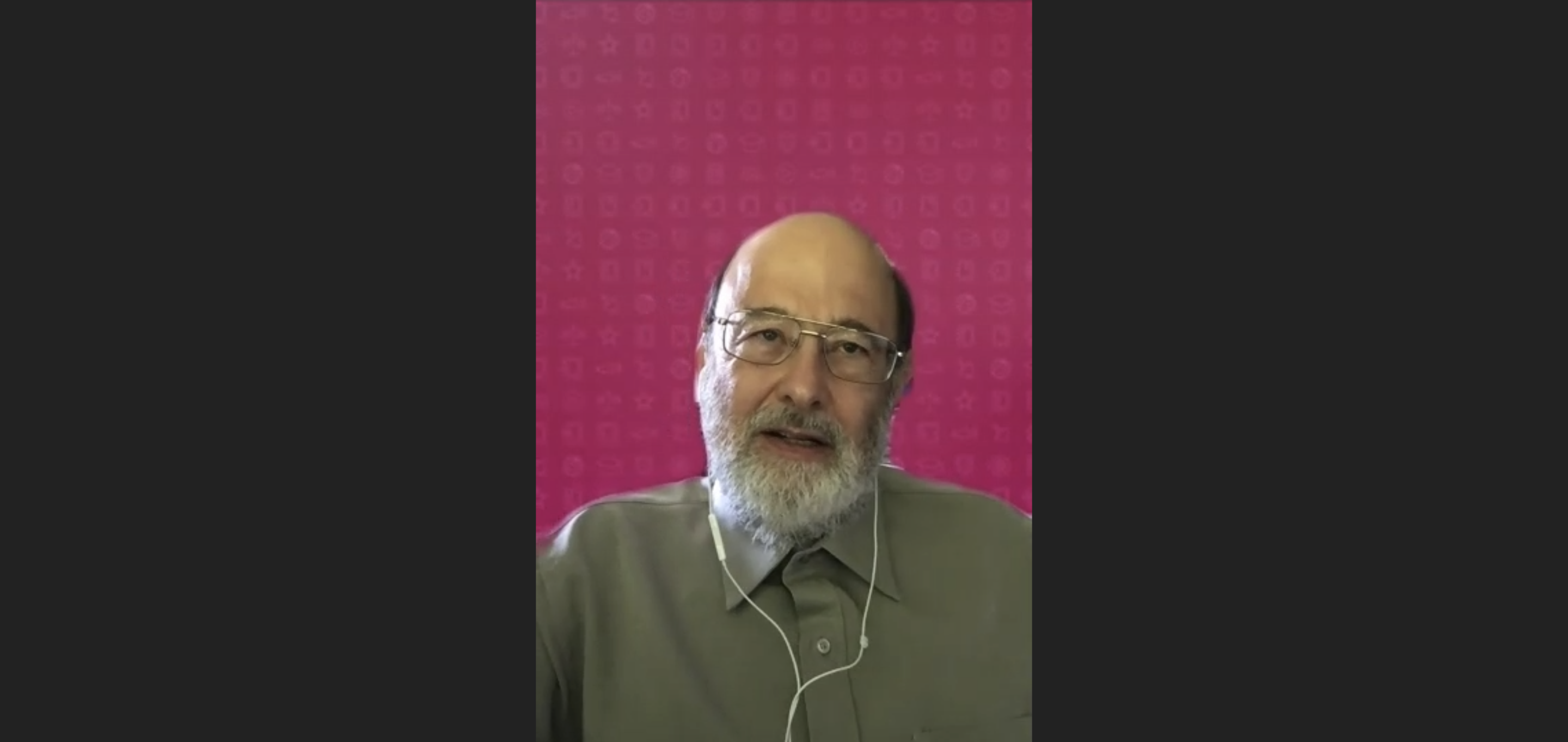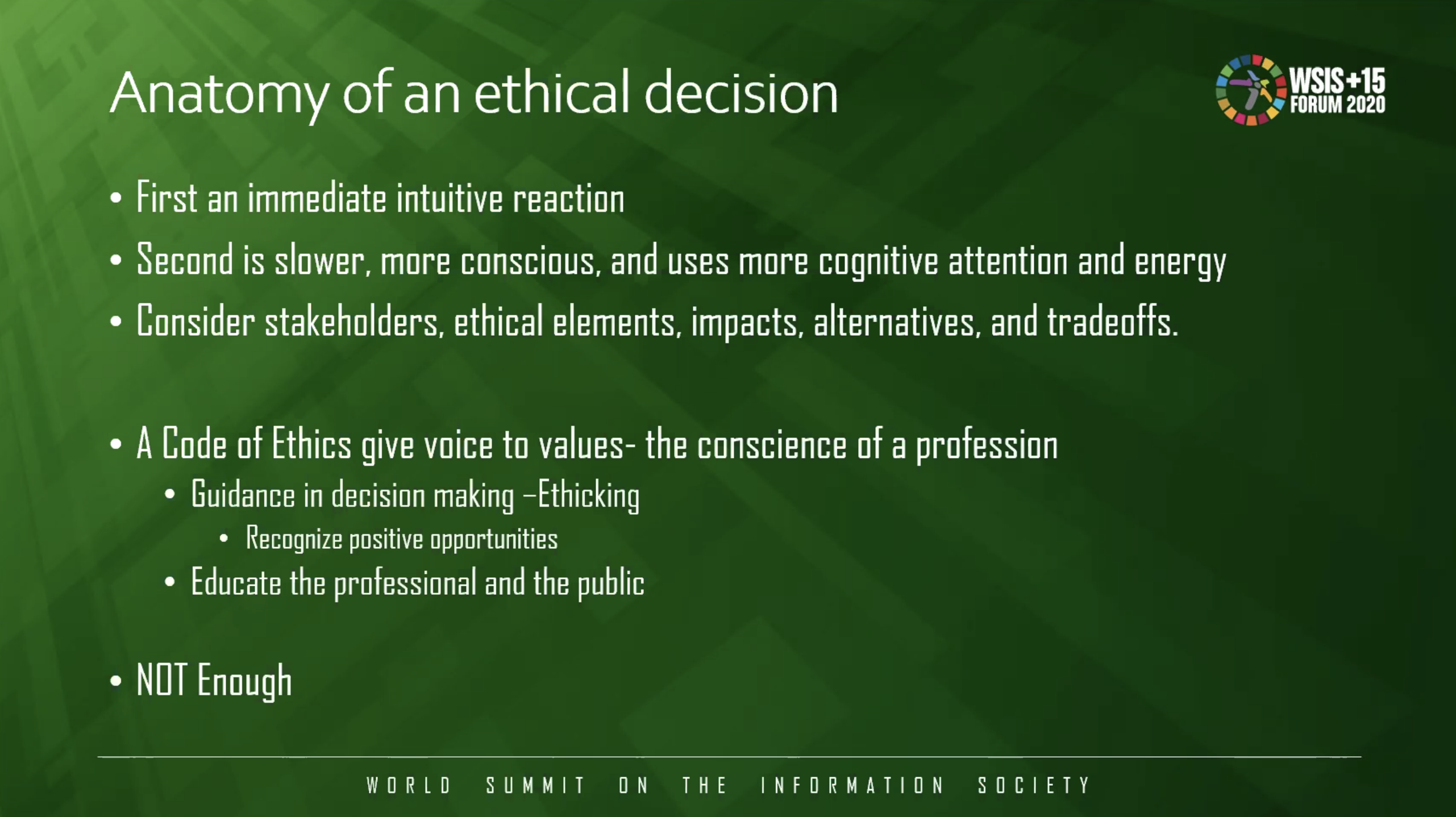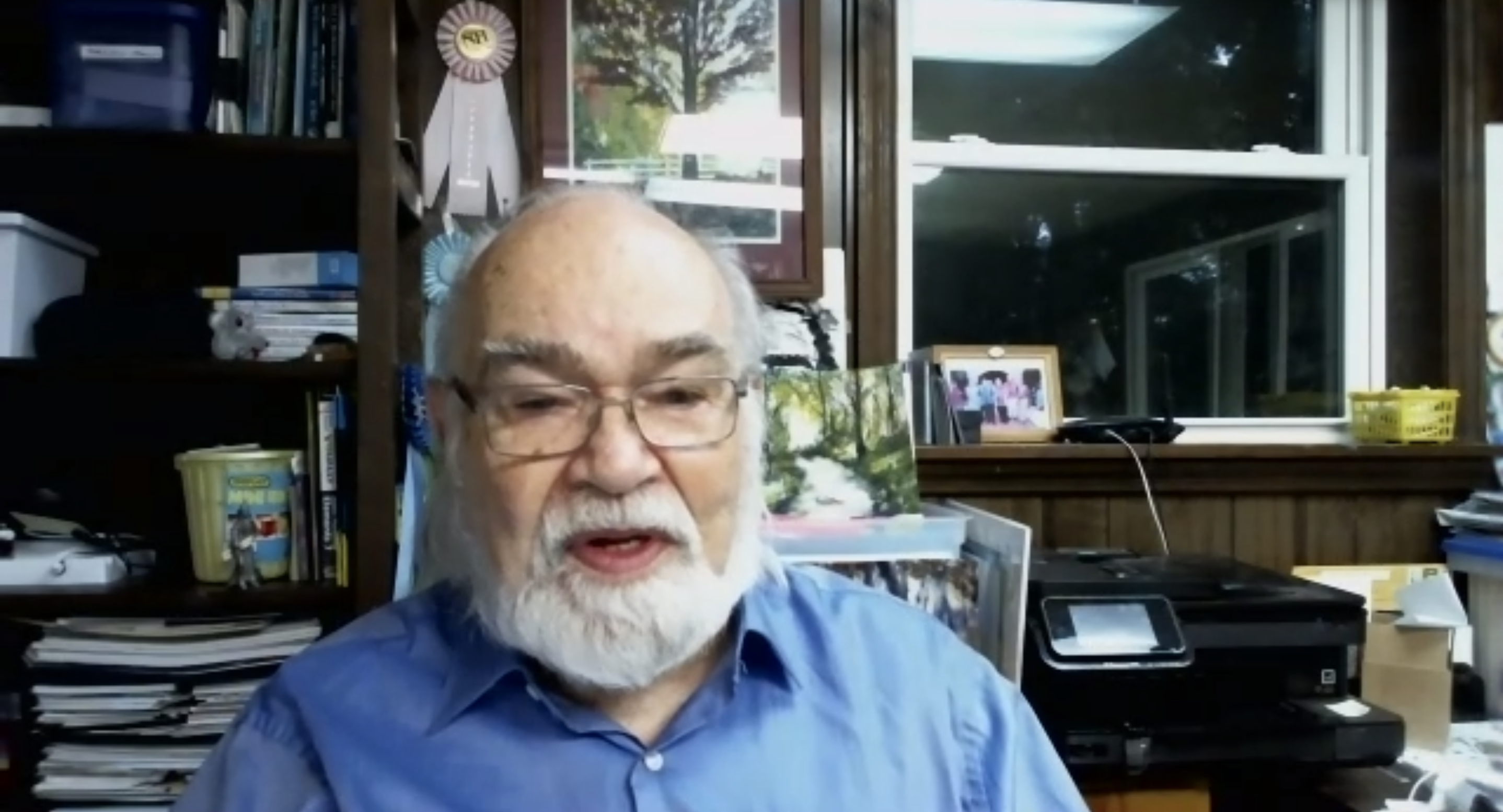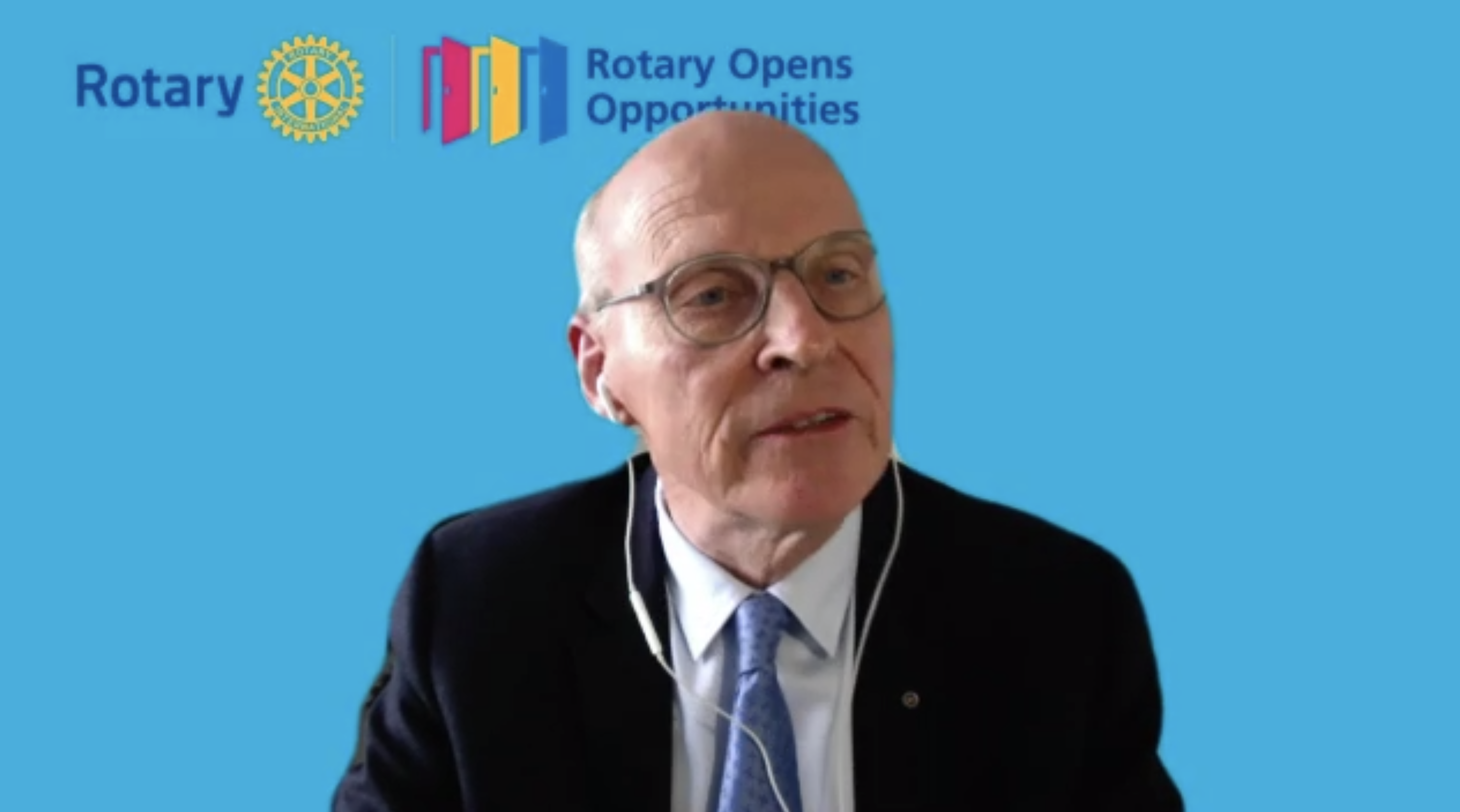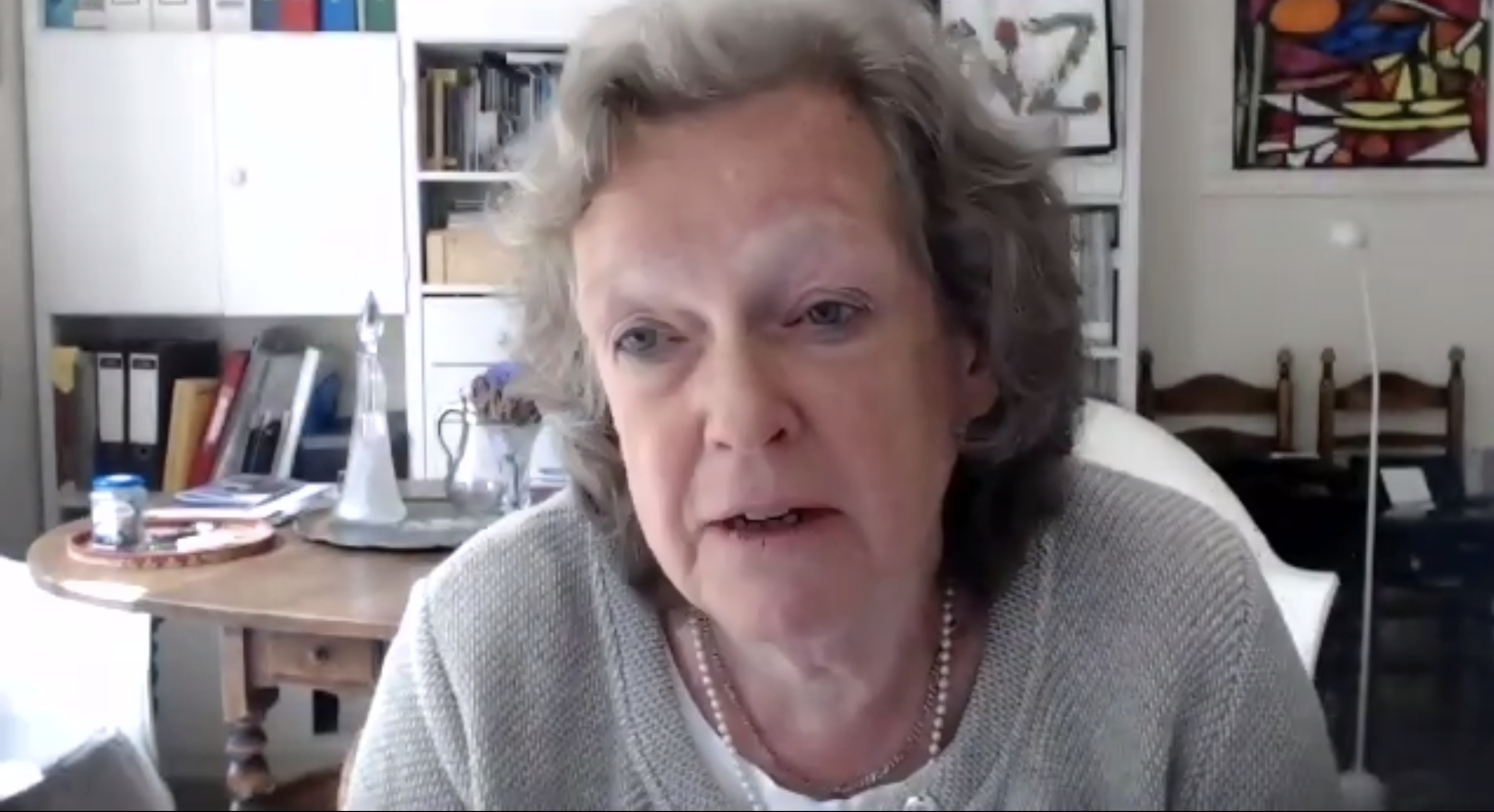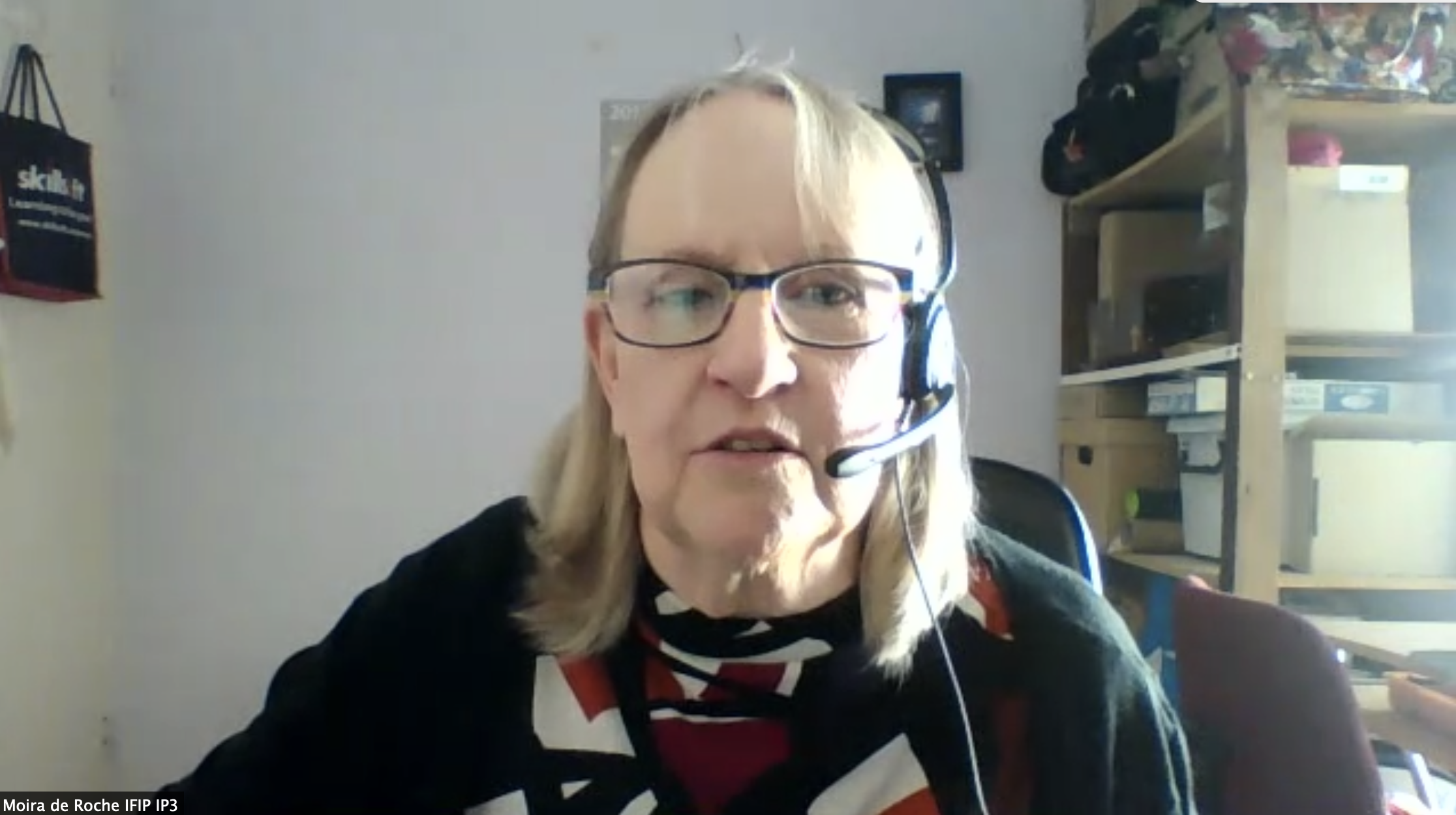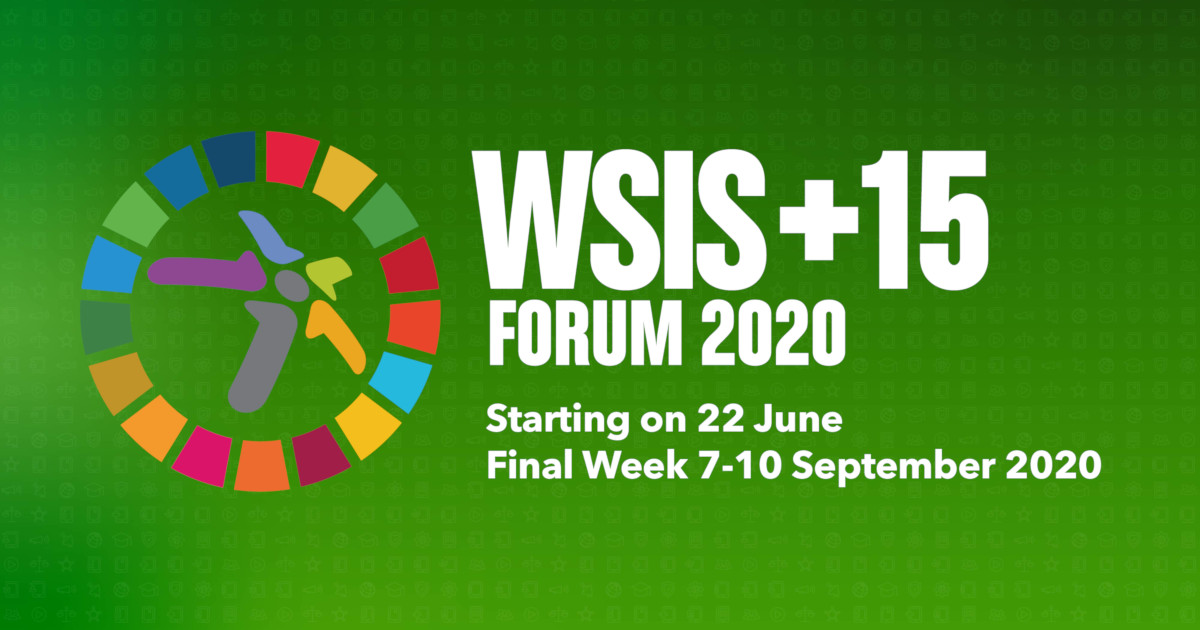Living the standard – how can the Information and Knowledge Society live to an ethical and FAIR Standard without needing to refer to a Codes of Ethics
International Federation for Information Processing (IFIP) IP3
Session 131
Looking at Codes of Ethics, and how these support trust in Digital. How digitally skilled citizenry drives economic growth
Topics addressed are:
- What role does a Codes of Ethics play? Should an exemplar Code of Ethics, recently created by IFIP, be used as a starting point and if necessary be amended and augmented to suit specific situations? The plethora of Codes of Ethics – some 180+, does not improve the situation and allows people to pick the one that suits them best (confirmation bias); Complementing Codes of Ethics with Law and Regulation; As generally Codes of Ethics are not legally binding, has Law and Regulation stepped in to complement the gaps to improve the public’s trust in goods and services that use new technologies including AI?
- How can we create Trust in Digital? Should we create and refine a body of knowledge, and an education program around how to behave as an ICT professional? The FAIR principal should dominate, must be included to the benefit of all: FAIR – Findable, Accessible, Interoperable, Reusable. Although this standard was set for data, it is applicable to every digital resource.
- Does a digitally skilled citizenry drive economic growth in all countries?
The WSIS Action lines C4, C5, and C10 are central in the workshop
- Capacity Building: Specifically building capacity and trust in the supply-side of ICT (C4).
- Building confidence & security in the use of ICTs (C5): What concrete steps can be taken by different parties in the wake of the growth of cyber-crime, which has surged during the COVID-19 pandemic? Can IFIP, AI for Good, non-profit organizations (Such as Rotary) and specialist security organizations such as ECSO work together to reduce the scourge? Confidence and trust will be built as the Information Society – including consumers and users - becomes better educated on Digital Skills.
- Ethical Dimension of ICT (C10): Digital Ethics and Trust are being spoken about at every level. But how do we live an ethical life, without than having to consult a Code of Ethics. Is Trust reinforced by ethical behavior?
Panelists:
- Moira de Roche IP3 chair – will chair the workshop
- Rotary Senior official – representing organizational leaders (To be confirmed)
- CSTD & IFIP: A Min Tjoa– Vice-chair CSTD representing the IT community
- Don Gotterbarn – ICT Ethics specialist chair and writer of ACM and IFIP code of conduct
- Liesbeth Ruoff – a member of CEN TC 428 representing the perspective of ICT professionalism
- Anthony Wong – Vice President IFIP, technologist and lawyer, speaking on AI
After an introduction of no more than three minutes, each panelist will speak from three to five minutes. The remaining time will allow for questions from delegates, as well as further exploration into the topics by the panelists.

Moira de Roche is an independent consultant, specializing in business and learning strategy.
She is the Chair of IFIP (International Federation for Information Processing) IP3, and a member of the IFIP board. She is also a Director on the Global Industry Council, an IFIP think-tank comprised of senior people from all parts of the globe who are involved with ICT.
Moira is an accomplished speaker and has presented at conferences around the world and in South Africa, on diverse subjects including Technology & Learning, IT Leadership, Future Skills and more. Her speaking engagements on behalf of IP3 have seen her speaking on Professionalism, Trust & the Duty of Care in Digital, as well as people-related issues with Industry 4.0. She has attended the World Summit for Information Society since 2012
She is a Professional Member and Fellow of IITPSA (Institute of IT Professionals South Africa) and currently serves as a NED. She is also a member of ACM and the Institute of Directors.
Moira is passionate about learning and ethics.
Jan Lucas Ket retired in 2011 from Waterland Hospital in Purmerend, where he had been a pediatrician for 30 years — treating 20,000 children and one baby gorilla — and served as chair of the hospital’s medical staff. Ket has participated in national and regional teams and networks for pediatrics and public health. He is now vice president of the Waterland School for Music.
Rotary is a 115-year-old global humanitarian aid organization. There are clubs around the world representing some 1.2 million members, who share their knowledge and professional expertise. Integrity has always been a key principle for Rotary.
Ket coordinated logistics for a packaged grant scholarship awarded to an Indian sanitation official to study at the IHE Delft Institute for Water Education in the Netherlands. “As Rotarians, we are lucky because we have had opportunities,” Ket says. “I think the point of Rotary is to bring chances to others.”
A Rotarian since 1988, Ket has been a member of The Rotary Foundation Cadre of Technical Advisers and a lecturer on Rotary’s role in preventive health care for mothers and children at various international conferences. During his year as club president, he co-founded the Rotary Club of Jihlava, Czech Republic.
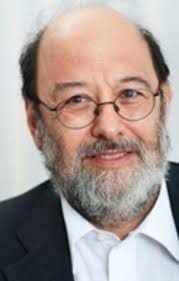
A Min Tjoa is full professor for Software Technology at TU WIEN (Vienna University of Technology) and executive chairperson of the Austrian governmental funded Competence Center for Excellent Technologies (“COMET-Center”) for Cybersecurity and Privacy (SBA).
He has been involved within WSIS since the initial WSIS-Geneva Summit in 2003 as member of the official Austrian delegation where he delivered the ICT UNCTAD Benchmarking Tool. Since 2007, he has been the Austrian delegate for the United Nations Committee on Science and Technology for Development (UN-CSTD) with its mandate by UN-ECOSOC to serve as the focal point in the system-wide follow-up to the outcomes of WSIS. He serves CSTD as its vice-chairperson 2015/15,2016/17,2017/18, as chairperson in 2018/19 and as vice-chairperson for 2019/20 and 2020/21.
He is currently the European Coordinator for Technology, Innovation and Sustainability of ASEA-UNINET (ASEAN-European Academic University Network).
Since 1989 he has been actively engaged in the organization and further development of the ICCHP-Conference (International Conference on Helping People with Special Needs) under the patronage of UNESCO initiated by Roland Wagner and him as early as 1989.
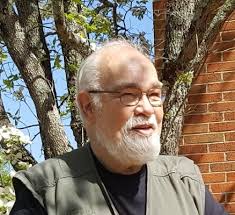
Don Gotterbarn has extensive experience both in academia and as a software systems developer. He has spent several decades promoting responsible computing practices, including as director of the Software Engineering Ethics Research Institute and as a visiting professor at the Centre for Computing and Social Responsibility. He has taught at institutions like the University of Southern California, at government agencies like the NSA, and was a research fellow at Australian National University and a visiting scientist at Carnegie Mellon. He led the 2018 update of the ACM Code of Ethics and the development of the IEEE/ACM Software Engineering Code of Ethics and Professional Practice. He chairs IFIP’s Ethical Frameworks group, is a member of IFIP’s IP3, the BCS ICT Ethics Specialist Group, and co-chairs the ACM’s Committee on Professional Ethics.
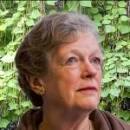
Liesbeth Ruoff - van Welzen, is currently involved in the development of the ecosystem around the competence framework e-CF. She focuses on ICT Professionalism in Europe as a special expert and as a member of CEN TC 428, and the local mirror Committee of NEN. Being a board member of IP3 and chair of IG digital skills of KNVI she creates a bridge from local to global in this area.
After starting as a marketeer in education and IT firms, she became a Group Vice President of IDC EMEA. She practices her expertise as a consultant in LRWA.

Anthony has double degrees in Computer Science and Law from Monash University, Master of Laws in Media, Communications and IT from UNSW, and a Master of Intellectual Property from UTS, Australia.
He has also held senior management positions in multinational corporations and government. His multi-disciplinary career traversed legal practice, multinationals in the IT Industry, including as CIO of the Australian Tourist Commission during the Sydney 2000 Olympics and led the digital transformation of Thomson in the Asia Pacific.
Anthony is the Managing Director of AGW Lawyers & Consultants, a multidisciplinary legal and advisory practice in many areas of law and technology including AI, and the data and digitization industries.
He is the Vice President of the International Federation for Information Processing (IFIP) and the Vice-Chair of IFIP IP3. He is Past President of the Australian Computer Society (ACS) and Past President of SEARCC.
Anthony is an industry thought leader, a regular commentator, and presenter on topical issues. He served on the IT Industry Innovation Council for the Australian Government and chaired the New South Wales Government ICT Advisory Panel and served on the Digital Transformation Taskforce.
-
 C1. The role of governments and all stakeholders in the promotion of ICTs for development
C1. The role of governments and all stakeholders in the promotion of ICTs for development
-
 C4. Capacity building
C4. Capacity building
-
 C5. Building confidence and security in use of ICTs
C5. Building confidence and security in use of ICTs
-
 C10. Ethical dimensions of the Information Society
C10. Ethical dimensions of the Information Society
o AL C4 Capacity Building - Specifically building capacity and trust in the supply-side of ICT (C4)
o AL C5 Building confidence & security in use of ICTs (C5) -What concrete steps can be taken by different parties in the wake of the growth of cyber-crime, which has surged during the COVID-19 pandemic? Can IFIP, AI for Good, Rotary and security specialist organizations such as ECSO work together to reduce the scourge? Confidence and trust will be built as the Information Society – including consumers and users - becomes better educated on Digital Skills.
o AL C10 Ethical Dimension of ICT - Digital Ethics and Trust are being spoken about at every level. But how do we live an ethical life, without having to consult a Code of Ethics. Is Trust reinforced by ethical behavior?
-
 Goal 1: End poverty in all its forms everywhere
Goal 1: End poverty in all its forms everywhere
-
 Goal 4: Ensure inclusive and equitable quality education and promote lifelong learning opportunities for all
Goal 4: Ensure inclusive and equitable quality education and promote lifelong learning opportunities for all
-
 Goal 5: Achieve gender equality and empower all women and girls
Goal 5: Achieve gender equality and empower all women and girls
-
 Goal 8: Promote inclusive and sustainable economic growth, employment and decent work for all
Goal 8: Promote inclusive and sustainable economic growth, employment and decent work for all
-
 Goal 10: Reduce inequality within and among countries
Goal 10: Reduce inequality within and among countries
SDG1 - Digitally skilled workforce will contribute to the economy
SDG4 & SDG5 - Trustworthy computing and digital skills to enable learning and economic opportunities for all, at all life-stages.
SDG8 - Digital skills for all which are accessible and FAIR – Findable, Accessible, Interoperable, Reusable
SDG10 - Societies that are digitally skilled will be more competitive, both internally and with other countries
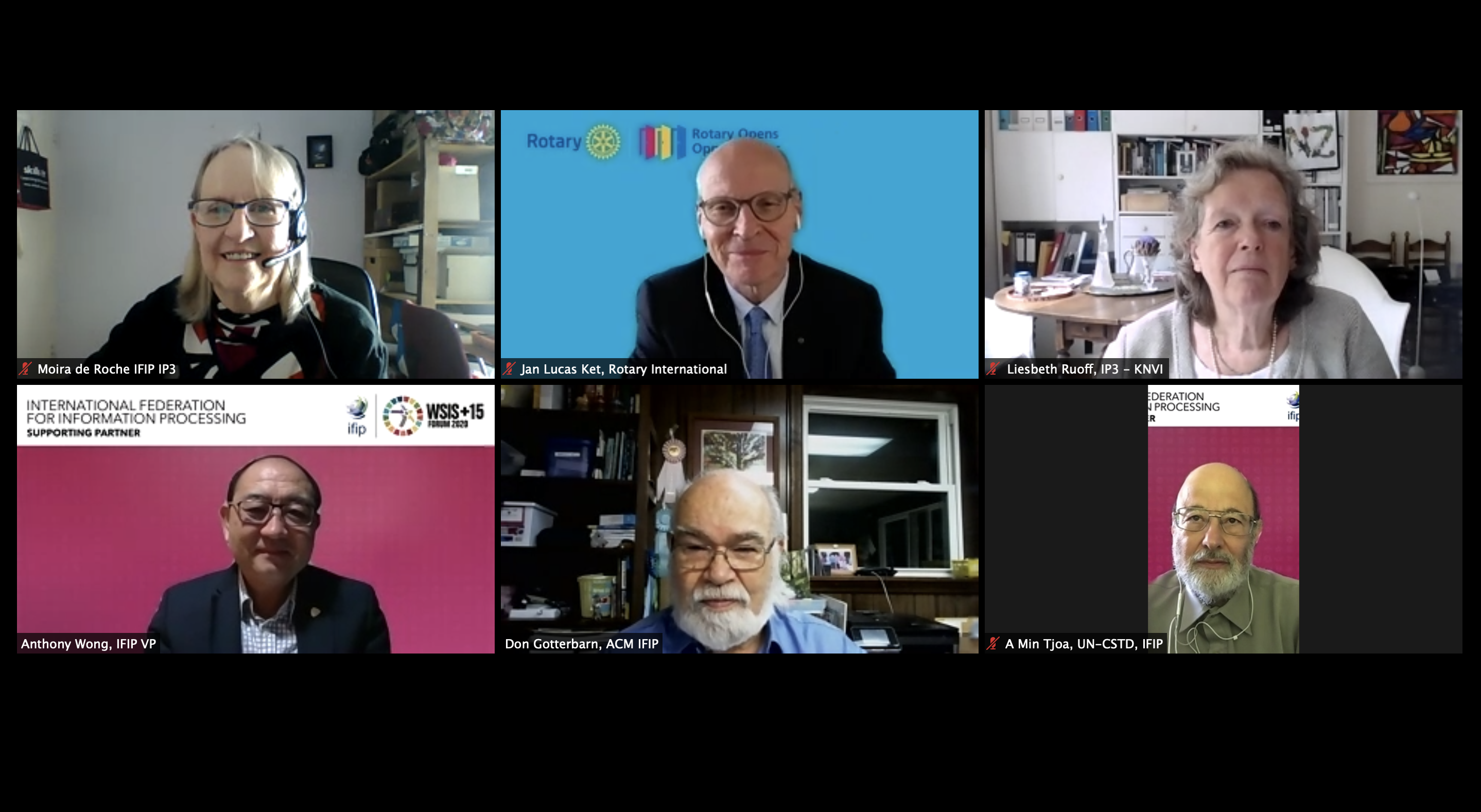
.png)
